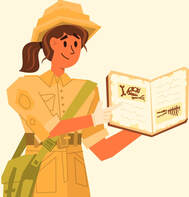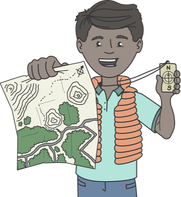History & Geography
Intent
At St James CofE Primary School, our History and Geography curriculum aims to: develop all children’s understanding of their place in the world by promoting their curiosity and fascination for the world around them.
Our history curriculum encourages our pupils to become active learners and develop their passion for history and a sense of who they are - locally, nationally and globally. Our aim is to develop well-rounded and successful historians, informed by the National Curriculum, and exposed to planned and differentiated lessons, taught with a clear history objective. Pupils will
develop their knowledge of chronology, allowing them to achieve a sense of time and an overall understanding of when events took place. In addition, we aim to ensure continuity and progression across key stages, recognising History as an enquiry with a focus on skills and deepening knowledge and understanding, encouraging pupils to be curious and inquisitive learners.
Our geography curriculum has been designed to inspire awe and wonder in pupils about the world that we live in, and the people in it. We believe that our geography curriculum is fundamental in broadening our pupils’ experiences of the world around them, as well as current environmental issues. Our geography curriculum equips pupils with the knowledge and
skills that they need to appreciate and understand a diversity of places, people, natural and human environments, as well as the Earth’s key physical and human processes. We aim to encourage pupils to ask questions and understand both their locality and the wider world.
As well as explicitly teaching these subjects in KS1 and KS2, at St James, we promote the teaching of both history and geography, taught as a combined skill set as part of our ‘Local Area Study’. Our ‘Local Area Study’ provides pupils with both the knowledge and skill set needed to understand the history and geography of where they live. By exploring their locality and allowing pupils to put their learning into context, pupils are encouraged to develop a deeper understanding and appreciation of their immediate surroundings.
At St James CofE Primary School, our History and Geography curriculum aims to: develop all children’s understanding of their place in the world by promoting their curiosity and fascination for the world around them.
Our history curriculum encourages our pupils to become active learners and develop their passion for history and a sense of who they are - locally, nationally and globally. Our aim is to develop well-rounded and successful historians, informed by the National Curriculum, and exposed to planned and differentiated lessons, taught with a clear history objective. Pupils will
develop their knowledge of chronology, allowing them to achieve a sense of time and an overall understanding of when events took place. In addition, we aim to ensure continuity and progression across key stages, recognising History as an enquiry with a focus on skills and deepening knowledge and understanding, encouraging pupils to be curious and inquisitive learners.
Our geography curriculum has been designed to inspire awe and wonder in pupils about the world that we live in, and the people in it. We believe that our geography curriculum is fundamental in broadening our pupils’ experiences of the world around them, as well as current environmental issues. Our geography curriculum equips pupils with the knowledge and
skills that they need to appreciate and understand a diversity of places, people, natural and human environments, as well as the Earth’s key physical and human processes. We aim to encourage pupils to ask questions and understand both their locality and the wider world.
As well as explicitly teaching these subjects in KS1 and KS2, at St James, we promote the teaching of both history and geography, taught as a combined skill set as part of our ‘Local Area Study’. Our ‘Local Area Study’ provides pupils with both the knowledge and skill set needed to understand the history and geography of where they live. By exploring their locality and allowing pupils to put their learning into context, pupils are encouraged to develop a deeper understanding and appreciation of their immediate surroundings.
|
Implementation Our curriculum is underpinned by the National Curriculum, which has been adapted so that learning is put into meaningful contexts that will be built upon each other as children progress through school. In Key Stage One and Key Stage Two, History and Geography are taught explicitly through half termly topics that alternate with one another. Where appropriate, this topic may also influence the focus of Music, Design Technology and Art and Design, as well as our book-led curriculum in English. These topics are centred on an enquiry question and the focus is to allow children the opportunity to delve deeper as historians and geographer so that they develop knowledge and skills that support them in answering the question. At St James, we strive to teach a progressive and diverse curriculum which is constantly evolving. In history, we facilitate investigation and enquiry as part of our curriculum, so that the children can explore how history shapes the past, the present and the future. Our curriculum emphasises the importance of children asking and answering questions towards historical sources, historical figures and each other: so that they are actively learning and building on their history skills as they progress through school. We will ensure that our children are equipped with historical skills and knowledge that will enable them to be ready for the curriculum at Key Stage 3 and for life as an adult in the wider world. We want our children to have thoroughly enjoyed learning about History, therefore encouraging them to undertake new life experiences now and in the future. In geography, children are taught the geographical knowledge and skills to help them explore, navigate and understand the world around them. The children are encouraged to value and respect their place in the world as local, national and global citizens. The children’s knowledge and skills will develop progressively as they move through their school career, so that they not only meet the requirements of the National Curriculum, but are also competent and confident geographers in the world. We expect that, by the end of Year 6, our pupils will have the skills and knowledge they will need to access the KS3 Geography curriculum. They will have sense of curiosity about the world and a mental ‘bucket-list’ of places in the world they would like to find out more about or visit in the future. Our pupils will have an awareness of and an interest in the world around them and be able to think critically about real life local and global issues. |
History & Geography Long Term Planning
“We study history not to be clever in another time, but to be wise always.” - Marcus Tullius Cicero
Curriculum Progression At St James, we strive to teach a progressive and diverse curriculum which is constantly evolving.
"A map says to you. Read me carefully, follow me closely, doubt me not... I am the Earth in the palm of your hands" - Beryl Markham
| ||||
|
EYFS At St James' we ensure that we guide our EYFS children to make sense of their physical world and their community. Previously we focused our history and geography around: People and communities, The world and Technology. Under the new framework we have made changes to make it look much more structured and relatable to history and geography, with a focus on:
The aim of the new EYFS framework in regard to history and geography is still to ‘guide children to make sense of their physical world and their community’. We have also introduced the new additions, which provides:
Another way that history and geography is taught in EYFS in the new framework in to focus on key additions to the setting, such as:
|
Progression of Knowledge and Skills
Key Vocabulary Key vocabulary is identified on knowledge organisers that are created for both history and geography topics. The use of knowledge organisers enables key vocabulary, skills and knowledge to be embedded in long term memory so children have a clear understanding of the subject area. There is explicit revisiting of prior learning and key vocabulary through retrieval activities to ensure that children can build upon what they have learnt in previous terms, years and Key Stages. Impact Outcomes in topic books, evidence a broad and balanced history and geography curriculums and demonstrate children’s acquisition of identified key knowledge relating to each of the national curriculum strands. As children progress throughout the school, they develop a deep knowledge, understanding and appreciation of their local area, their place in the wider world and the historical events that have shaped it. We measure the impact of our curriculum through the following methods:
| ||||




